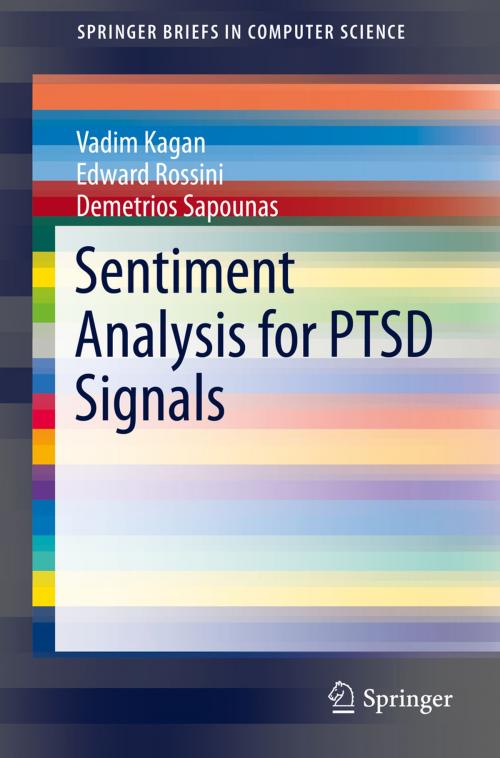Sentiment Analysis for PTSD Signals
Nonfiction, Computers, Advanced Computing, Artificial Intelligence, Database Management, General Computing| Author: | Vadim Kagan, Edward Rossini, Demetrios Sapounas | ISBN: | 9781461430971 |
| Publisher: | Springer New York | Publication: | October 25, 2013 |
| Imprint: | Springer | Language: | English |
| Author: | Vadim Kagan, Edward Rossini, Demetrios Sapounas |
| ISBN: | 9781461430971 |
| Publisher: | Springer New York |
| Publication: | October 25, 2013 |
| Imprint: | Springer |
| Language: | English |
This book describes a computational framework for real-time detection of psychological signals related to Post-Traumatic Stress Disorder (PTSD) in online text-based posts, including blogs and web forums. Further, it explores how emerging computational techniques such as sentiment mining can be used in real-time to identify posts that contain PTSD-related signals, flag those posts, and bring them to the attention of psychologists, thus providing an automated flag and referral capability. The use of sentiment extraction technologies allows automatic in-depth analysis of opinions and emotions expressed by individuals in their online posts. By training these automated systems with input from academic and clinical experts, the systems can be refined so that the accuracy of their detection of possible PTSD signals is comparable to that of psychologists reading the same online posts. While a portion of the literature on this and related topics explores the correlation between text patterns in archived documents and PTSD, no literature to date describes a system performing real-time analysis. Our system allows analysts to quickly identify, review, and validate online posts which have been flagged as exhibiting signs or symptoms of PTSD and enables follow-up, thus allowing for the presentation of treatment options to the authors of those posts. We describe the ontology of PTSD-related terms (i.e., terms which signal PTSD and related conditions) that need to be tracked, the algorithms used for extraction of the intensity of these signals, and the training process used to fine-tune sentiment analysis algorithms. We then present the results of processing a validation data set, different from the training set, comparing the algorithmic output with opinions of clinical psychologists, and explain how the concept can be extended to detect signals of other psychological conditions. We present a sample system architecture and implementation which can be used to engage users and their families, either anonymously or eponymously, and use the sentiment extraction algorithms as an early screening tool to alert clinicians to participants who may require close monitoring or follow-up. Finally, we describe a user test conducted with users recruited from the Veteran population and present the results of the analyses on the data.
This book describes a computational framework for real-time detection of psychological signals related to Post-Traumatic Stress Disorder (PTSD) in online text-based posts, including blogs and web forums. Further, it explores how emerging computational techniques such as sentiment mining can be used in real-time to identify posts that contain PTSD-related signals, flag those posts, and bring them to the attention of psychologists, thus providing an automated flag and referral capability. The use of sentiment extraction technologies allows automatic in-depth analysis of opinions and emotions expressed by individuals in their online posts. By training these automated systems with input from academic and clinical experts, the systems can be refined so that the accuracy of their detection of possible PTSD signals is comparable to that of psychologists reading the same online posts. While a portion of the literature on this and related topics explores the correlation between text patterns in archived documents and PTSD, no literature to date describes a system performing real-time analysis. Our system allows analysts to quickly identify, review, and validate online posts which have been flagged as exhibiting signs or symptoms of PTSD and enables follow-up, thus allowing for the presentation of treatment options to the authors of those posts. We describe the ontology of PTSD-related terms (i.e., terms which signal PTSD and related conditions) that need to be tracked, the algorithms used for extraction of the intensity of these signals, and the training process used to fine-tune sentiment analysis algorithms. We then present the results of processing a validation data set, different from the training set, comparing the algorithmic output with opinions of clinical psychologists, and explain how the concept can be extended to detect signals of other psychological conditions. We present a sample system architecture and implementation which can be used to engage users and their families, either anonymously or eponymously, and use the sentiment extraction algorithms as an early screening tool to alert clinicians to participants who may require close monitoring or follow-up. Finally, we describe a user test conducted with users recruited from the Veteran population and present the results of the analyses on the data.















